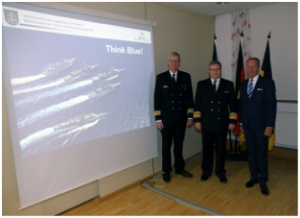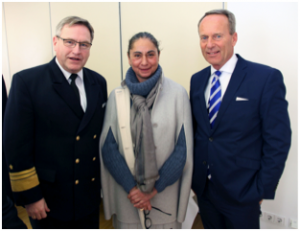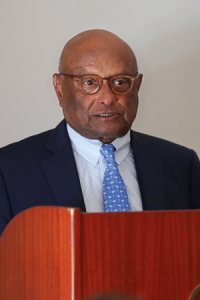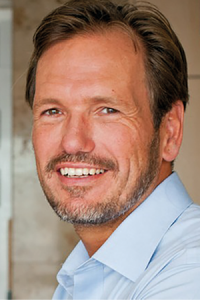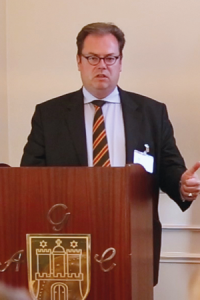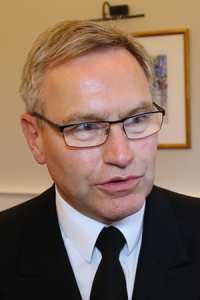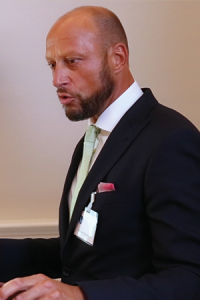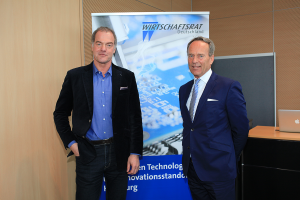Briefings – Lectures – Conferences – Publications (extract)
NEW: Strategic Briefing (SB) | “The world will not change, but it will be different”
The Strategic Briefing offers an (optional) 60 or 90-minute examination of the coming developments in the near future: How the situation in Germany is changing (internal view) and how international developments and new challenges in the period after the corona pandemic are to be assessed from a geopolitical and geoeconomic perspective (external view). I am conducting the Strategic Briefing together with futurologist Oliver Leisse. He is founder and managing partner of the futurology institute SEE MORE. Pointed input and dialogue alternate, the participants delve deeply into the relevant future topics.
The World is like a Chessboard and Geopoilitcs is like Chess
Times are more turbulent than ever, and the geopolitical as well as geostrategic general weather situation is characterized not least by the fact that old certainties have begun to waver. The world cannot rest easy, as geopolitical crises, conflicts and wars threaten trade, energy supplies and our prosperity. We have about 70 crises, conflicts and wars in the world. And taking the Ukraine war as an example, one of them is taking place right in our neighborhood.
Die Welt ist wie ein Schachbrett …
Pivot to Asia and Europe`s loss of importance. the associated loss of importance of Europe. A Geo-Strategic Perspective
When Donald Trump announces the withdrawal of about 12,000 U.S. soldiers, this is neither a “vendetta” against NATO member Germany, which does not want to increase its contributions, nor a change of strategy in American foreign and security policy. Quite the contrary: With this plan Trump is continuing the reorientation of the world power towards Asia (Pivot to Asia) already initiated under his predecessors. One of the concomitant effects: Europe and Germany are becoming less and less important. The article explains the geostrategic and geopolitical calculation behind the “Pivot to Asia” strategy of the US administration and explains how the negotiations for a “New START” agreement (limitation of nuclear weapons) – in future with China? – are to be placed in this context. He also explains the current structure of the U.S. bases in Germany.
Secure Trade at Sea is a Collective Asset | ESD International Security & Defence Journal
At the 56th Munich Security Conference, which began on 14 February 2020, the participating heads of state and government as well as more than 100 foreign and defence ministers discussed the disintegration of the West in foreign and security policy under the heading ‘Westlessness’. Thus – at long last – an issue, which needs clarification, especially for Germany, has moved into the public interest, namely what security and defence policy must achieve in order to effectively represent the economic interests of Germany and Europe in an age of great power competition.
In her keynote speech on foreign and security policy at the Bundeswehr University in Munich, German Defence Minister Annegret Kramp-Karrenbauer made it clear that she wants to realign Germany’s foreign and security policy in terms of being more responsible, more courageous and, in terms of Germany’s role in the world, more appropriate. Germany, she emphasised, had a duty and, as one of the leading industrial and trading nations, had a great interest in protecting the international order – including through military action. Against the background of an increasingly multipolar world, terrorism, the rise and expansion of China and ‘America First’ with the withdrawal of the US from the world stage, she called for more funds to be available for the Bundeswehr and greater participation in foreign missions as far away as the Indo-Pacific. She also suggested a National Security Council, which could strengthen geopolitical thinking and create the necessary acceptance in society.
A Setting of the Course | The question of what German security and defence policy must be like
Such a change of course is overdue from an economic and political perspective. After all, the question of what German security and defence policy must be like – in order to effectively serve the economic interests of Germany and Europe in an age of global competition between major powers – has never been answered satisfactorily since the end of the Cold War.
There can hardly be any doubt that Germans in particular must have the greatest interest in the free exchange of goods and secure trade routes. After all, Germany is one of the largest import and export countries in the world. Most of its foreign trade – 95% of global trade in goods and 30% of European traffic – is transported by water. As a country poor in raw materials, Germany has to first bring many things from all over the world in order to refine them here and sell them to global customers. With around 1,400 ships, Germany has the largest container fleet and, with around 3,200 ships, the fourth largest merchant fleet in the world.
For Germany and EU member states, the maritime environment, therefore, plays an important geopolitical and geostrategic role in the geographical, security, economic and cultural sense.
In addition, 90% of foreign trade and 40% of EU domestic trade is reliant on maritime transport logistics. 80% of European oil and natural gas production comes from the North, Mediterranean and Adriatic Seas. The geopolitical focus is, therefore, turned towards the mari- time area and the EU is thus a global maritime player.
The dependence on free sea routes, the increasing importance of critical infrastructures for energy production and energy sources on the high seas, illegal maritime immigration, illegal arms and drug trafficking, piracy, organised crime, terrorist attacks (for example on ships), oil platforms, port facilities, etc., represent major security and defence policy risks that must be dealt with. Also in the future – at least according to the confessions of those in power – Germany should continue to be one of the engines of the global economy. It is often forgotten that this includes the ability to effectively assert one’s own interests. Frederick the Great already knew this when he noted: “Diplomacy without weapons is like an orchestra without instruments“.
Wolfgang Ischinger also put it in a nutshell when he wrote: “You cannot conduct foreign policy without the military. Otherwise, foreign policy is just hot air.” The maritime aspects of national and alliance defence are of particular importance here, because the trade routes on the world’s oceans are not only the main arteries of globalisation, they also form the basis for growth and prosperity in Germany and Europe.
Maritime security is, therefore, long since been discussed not only in the situation centres of the military or politics, but also on the management floors of internationally operating companies. And terrorist attacks are by no means the only risk. If – as already discussed – ‘bottlenecks’ such as the Strait of Hormuz, Straits of Malacca or Suez Canal – the most sensitive bottlenecks in the sea route between Europe and Asia, or even the Kiel Canal – become impassable by whatever act, almost every company involved in world trade will be affected – even the LIDL-market around the corner. Another idea that robs many entrepreneurs of sleep is that of a radiological weapon, also known as a ‘dirty’ bomb, which is smuggled into one of the approximately 38 million containers that constantly pass through the world’s sea routes and ports. Or the so-called ‘asymmetric’ or ‘hybrid’ threats, which include digital espionage and the sabotage of, for example, nuclear reactors or basic medical care.
More Responsibility Means More Safety. Also and Especially for the German Economy
These examples illustrate the increased vulnerability, but also the sheer necessity of a ‘Secure Economy’, i.e. a security architecture that better protects the German economy, also in maritime terms. In Germany, this protection is the task of the Navy – provided that it has sufficient ships, personnel, equipment and materials. In addition, the political mandate to protect maritime trade routes must be clearly defined operationally (the primacy of politics). Unfortunately, however, this is not the case either. For example, according to the current constitutional situation, the Navy is not entitled to intervene in the event of danger from international terrorism without a corresponding mandate, neither on its own coastal apron nor in the global area, as the prevailing legal opinion is that this is a ‘police task’. Germany, therefore, urgently needs a national security concept, which also and above all clearly regulates the role of the Navy in protecting maritime trade routes.
Five Major Regions: USA, China, Russia, India and the Europeans!
World politics is also maritime politics, and the German Navy contributes its share to global prevention and crisis management. As the German Navy cannot manage the protection of sea routes alone, it usually operates in cooperation with other NATO navies and partners. This is why we need a Europe that is capable of taking action in the field of security policy on the basis of a European defence and security concept that does not remain a political declaration of intent but is implemented in concrete terms in order to be prepared for the threats and dangers of the ‘new age’. The US accusation that Germans and Europeans are merely ‘free riders’ of US military strength cannot completely be dismissed.
So, if EU member states – the second largest economic area in the world with over 500 million people – were to expand their capabilities for securing the sea routes and undertake this in cooperation within the framework of a common security concept, they would show that they were living up to their responsibilities. The EU also needs a global political vision and a long-term geostrategic perspective as an independent alternative between
‘Americanisation’ and the Chinese dream in order to gain acceptance on the international stage and, above all, to defend its own interests. All of this also against the background that we are tending towards a world order in which there is no longer a guardian, but rather five metropolitan areas: USA, China, Russia, India and the Europeans!
We live in volatile and demanding times when it comes to defence policy. The security environment that we believe to take advantage of is only a virtual one. That makes it all the more important that EU member states should now take responsibility and finally expand their ability to safeguard German economic interests within the framework of a common security concept. They finally owe this to the business community but also to their citizens.
Certainly the 56th Munich Security Conference offers the opportunity for governments to discuss such a concept.
Secure Trade is a Collective Asset
Geopolitics around the blue gold. Water is the most important resource of the future | The acute shortage of water is no longer the problem of a few regions, but concerns all Europeans
One raw material without which nothing works at all is (fresh) water. Water? May you think. It’s not a raw material, that’s a matter of course. For us it is, thank God. Water has many facets. For millions of people on this earth it is a scarce commodity. For many of us, however, it is a lifestyle product. We buy water that is bottled in the moonlight, added with vitamins or extracted in the most remote regions of this earth, because it promises us health or spiritual healing. The demand for bottled water has increased dramatically – not only in the industrialized countries of Western Europe, but also in the developing countries. This means that water is already the most important raw material in the world. And its importance will continue to grow!
At around 80 percent, agriculture accounts for the largest share of global water consumption. Bio-energy and bio-fuels have increased demand enormously. Last but not least, water supplies us with energy. No raw material is as important, not even crude oil. In one region of the world, water is scarce; in the other, there is an abundance of water. Wars are already being fought over it – elsewhere it is wasted.
Access to clean water is a human right. Nevertheless, some 2.6 billion people worldwide have no access to an organised water supply and sanitation system. 95 percent of the world’s cities do not have a regulated sewage disposal system as we know it in Germany. But even here, waste is still a major problem: experts estimate that in developed countries, too, no less than half of the water used is lost in the supply network. In Germany, the proportion is “only” between 5 and 10 percent, in Spain it is already 25 percent and in London alone 800 million liters per day seep away through leaks in the pipe system. In Germany, the water pipe and sewerage network is so long that it could wrap around the earth 13 times.
In addition, there are increasing record droughts, for example in California or Cape Town, huge crop failures due to dry summers, for example in Europe, or other environmental and climate changes, for example in Syria, the Lake Chad region or Mali, which have already exacerbated existing conflict dynamics. At higher temperatures, water also evaporates faster. Water supply and demand is increasing worldwide. Demand due to population growth because more people need more water, whether for drinking, cooking, washing or agriculture, to produce enough food. Added to this is the growing global economy and the resulting demand, because production processes require water. Rising incomes and living standards lead to changed consumption habits, so that more and more water-intensive products, such as coffee – water consumption per cup approx. 140 litres in production, or meat – water consumption per kilo approx. 10 to 15,000 litres in production. At the same time, direct water consumption is increasing, be it by washing machines, car washes, garden maintenance or swimming pools. On the other hand, however, the available water resources are diminishing, be it through increasing pollution of lakes and rivers, for example through fertilizers, or household and industrial waste water. More than 80 percent of all wastewater worldwide is discharged untreated into lakes, rivers or seas! And groundwater reservoirs are also in a problematic state, as they are literally pumped empty in many places, for example through tomato production in Spain or rose cultivation in Ethiopia.
The global “competition” for water is increasing: Private households account for about 10 percent of consumption, industry for about 20 percent and agriculture for about 70 percent of the world’s water resources, with the remark that water consumption varies greatly from region to region. Nevertheless, water is needed everywhere, be it in households, agriculture, international business conglomerates, the tourism industry (hotel complexes, resorts, golf courses, etc.)
– In 2025, 8.3 billion people will populate our planet – a good 1.3 billion more than today.
– The annual demand for drinking water will increase accordingly – from today’s 4.4 billion to 5.2 billion cubic metres.
– Distribution of supplies: Asia, home to 60 percent of humanity, has only 39 percent of the world’s water resources. In South America, where six percent of the world’s population lives, the figure is 26 percent. 60 percent of water resources are located in only ten countries.
Access to the blue gold is already generating conflicts that will multiply with population growth and climate change. Water has played a decisive role in 37 wars over the last 60 years. It is estimated that two thirds of the world’s population will be lacking water by 2030. It can be assumed that the conflicts in the 21st century will revolve around raw materials and in particular around the blue gold “water”, which is becoming scarcer everywhere. A few examples:
– Roses from Ethiopia – water intensive flower growing threatens to dry up the country’s lakes
– Sào Paulo – the city on the dry
– Bali – How the tourism industry literally digs up the water
– Tibet – If the glaciers in the Himalayas continue to shrink, droughts and crop failures will threaten downstream
– Mekong – Six riparian states compete for the water of South East Asia’s most important river
– Nile – Ethiopia’s new mega dam endangers water supply in Sudan and Egypt
– Israel is a pioneer in water management and leaves the Palestinians on dry land
– Latin America is the most water-rich region in the world and yet 50 million people have no access to clean water
– Vosges – Here Nestlé fills hundreds of millions of bottles of mineral water every year, leaving hardly anything for the inhabitants
Many conflicts in the 21st century revolve around dwindling resources. Water is one of them. According to estimates, a growing world population, increasing life expectancy and rising prosperity will lead to a doubling of global water consumption by 2050. Worldwide, more than 90 percent of the water supply is directly or indirectly in public hands. The need for action can be described as urgent, as the consequences of climate change will drastically worsen the water situation in the coming decades.
The question therefore arises as to the overarching geopolitical and geostrategic master plan on the part of governments to solve a possible global water crisis, namely
First, a sustainable use of water is necessary and, if desired, possible. Second, to provide access to water while ensuring efficient resource management to combat the water crisis. Initial approaches have been made: With integrated water resources management (IWRM), states want to ensure that surface waters, aquifers and coastal waters are sustainably managed and thus used with care. Thirdly, a direct link between Europe and the global water crises may not seem obvious, but it does exist. Countries such as Germany, France, Great Britain or the Netherlands are not only highly dependent on global water reserves, they also exacerbate the water emergency in already arid regions by importing water-intensive products such as coffee, tea, cocoa, tomatoes, flowers etc.
In the meantime, the acute water shortage is no longer just the problem of a few regions, but concerns all Europeans.
Secure Economy. The Maritime Interests of the Federal Republic of Germany | Safe Trade at Sea is a Collective Good
While the current political debate is primarily about climate change, trade conflicts or the rise of the politcal party AfD, one issue that is essential for all of us is increasingly losing sight of: the question of what security and defence policy must achieve and deliver in order to effectively represent the economic interests of Germany and Europe in the age of global competition between major powers.
There can be little doubt that we Germans in particular must have the greatest interest in the free exchange of goods and secure trade routes; after all, we are one of the world’s largest import and export nations. The majority of Germany’s foreign trade – 95 percent of the intercontinental and 30 percent of the European traffic of the German economy – is transported by water. As a country poor in raw materials, we first have to bring many things from all over the world to Germany in order to refine them here and sell them to customers all over the world. This, too, is mainly done by sea. With around 1,400 ships, Deutsche Reeder operates the largest container fleet in the world and the fourth largest merchant ship fleet in the world with around 3,200 ships. Also in the future – so at least the confessions of the rulers – our country should rank among the engines of the global economy. It is often forgotten that this also includes the ability to effectively assert one’s own interests. Frederick the Great already knew: “Diplomacy without weapons is like an orchestra without instruments”. The Bundeswehr’s (German Forces) maritime capabilities are of particular importance here, because the trade routes on the world’s oceans are not only the main arteries of globalization, they also form the basis for growth and prosperity in Germany.
For a long time now, maritime security has therefore not only been discussed in the situation centres of the military or politics, but also in the management floors of internationally operating companies. Terrorist attacks are by no means the only risk. If, for example, “bottlenecks” such as the Strait of Hormuz, the Strait of Malacca or the Suez Canal – the most sensitive bottlenecks of the sea route between Europe and Asia, or even the Kiel Canal – are impassable by any act or actor, almost every company involved in world trade is affected. Even the LIDL market around the corner.
Another idea that is robbing some entrepreneurs of their sleep is that of a radiological weapon, also known as a “dirty” bomb, which is smuggled into one of the 38 million containers that constantly pass through the world’s sea lanes and ports.
The examples illustrate the increased vulnerability, but also the sheer necessity of a “secure economy”, i.e. a security architecture that better protects our economy in maritime terms as well. In the Federal Republic of Germany, this protection is the task of the navy – but the prerequisite for fulfilling the contract is that it has sufficient personnel and material at its disposal. In addition, the political will to protect the maritime trade routes must be clearly defined (primacy of politics). To this end, it may be necessary to reconsider the applicable legal and operational framework. According to the current legal situation, the navy is not entitled to intervene either in its own coastal foreland or worldwide in the absence of a corresponding mandate, for example in the event of danger from international terrorism, as the prevailing legal view is that this is a “police task”. Our country therefore urgently needs a national security concept in which the role of the navy in protecting maritime trade routes is clearly regulated. Because the German Navy cannot protect the sea routes alone, it usually operates in conjunction with other NATO navies and partners. That is why, secondly, we need a European defence and security concept in the near future that does not remain a political declaration of intent but is implemented in concrete terms. So far, the accusation by the USA that we Germans and Europeans are only “free-riders” of US military strength cannot be completely rejected. So if the states of the European Union expand their capabilities to secure sea routes and cooperate within the framework of a common security concept, they would show that they are living up to their responsibilities. This also against the background of the fact that we tend towards a world order in which there is no longer a guardian, but five metropolitan areas: the USA, China, Russia, India and Europe! World politics needs Europe.
We live in volatile and extremely complex and demanding times in terms of defence policy. The security in which we weigh ourselves is only an apparent one. That makes it all the more important for the governments of the European Union now to take responsibility for their own security.
And only then could one justifiably speak of “Secure Economy”. This article is also available as pdf – see below.
Navy and Economy in the dialogue | 4. Navy-Round-Table in Frankfurt / Main
On May 23, 2018, the 4th Marine Round Table took place in Frankfurt am Main. The annual event – after Hamburg, Munich / Bavaria and Stuttgart / Baden-Württemberg – was aimed specifically at the entrepreneurs and managers of medium-sized companies from the Frankfurt at Main / Hessen: What can entrepreneurs do for maritime security, for free trade and safe sea routes? About 50 executives were invited by Vice Admiral Rainer Brinkmann, Deputy Inspector of the Navy and Commander of the Fleet, and Ludolf Baron von Loewenstern, a family entrepreneur and Captain of the reserve German Navy, followed in the plenary hall of the town hall, the so called Roemer.
The Marine-Round-Table also celebrated the 170th anniversary of the German Navy at its “birthplace”. The Frankfurt National Assembly had decided on June 14, 1848 in the Paulskirche to build a first all-German fleet – to protect the maritime trade and to fight in the Schleswig-Holstein war against Denmark in 1851. For more than four years, this “Imperial” or “Federal Fleet” naval force drove under the colors black-red-gold, until it was replaced by the newly developed Royal Prussian Navy.
Lecture Series | The World in troubled times. Crises and Conflicts in the Year of the German G20-Presidency
Lecture 1: >The World in troubled times in the Year of the German G20-Presidency<
Perhaps you have been waiting for some years since, that everything will eventually become “normal” again. But the normality is a long way off – probably it is quite a thing of the past. Globalization and digitization shape our time. They have brought a breathtaking dynamism of change and global uncertainty. What specific effects do both phenomena have? How do they affect politics, business and society – but above all: how can we deal with you without falling into fearful passivity? Especially the upcoming elections in Germany and Europe in the coming weeks and months could be like new fire accelerators. In his lecture, Ludolf von Loewenstern examines selected aspects of current events and seeks to accept uncertainty as a characteristic of our time.
Lecture 2: >Crisis & Conflicts in the Year of the German G20-Presidency<
Germany took over the presidency of the G20 last year for a year. In addition to the European Union, this group includes 19 leading industrial and emerging economies, representing two-thirds of the world’s population and more than 80 percent of global economic output. In his speech, Ludolf von Loewenstern will focus on the German G20 agenda. Keywords such as stability, future viability and responsibility play a central role – but in uncertain times like these are a major challenge. What is the stability of the global economy? How future-oriented are our institutions and how can industrialized countries meet their responsibilities for the equitable participation of poorer regions? The speaker will address some of these questions in his speech. It also illuminates selected crises of crises all over the world, which cast their shadows long before our doors – from the crisis continent Africa to the civil war in Syria.
Navy and Economy in the dialogue | 3. Navy-Round-Table in Stuttgart
“Go Navy – Think Blue” is the slogan with which the navy would like to draw attention to entrepreneurs and managers of companies. In Stuttgart, the third event (after Hamburg and Munich / Bavaria) took place with 40 high-ranking entrepreneurs and managers from the Baden-Württemberg region. „Appetite to the Navy“ and „Understanding the Navy“ are the goals. The entrepreneurs and managers must also be interested in this.
In his lecture, Viceadmiral Rainer Brinkmann, Deputy Chief of the German Navy and Commander of the Navy and support forces, pointed out the importance of the maritime transport seatrade for the economy. Especially the German economy needs free sealines.
Where is the connection with the economy? Captain GN Thomas von Buttlar had an answer. In the fight for the “War-of-talents”, the economy has absolutely a substantial advantage, however, also the Navy can offer also a lot. Above all, the staff is the bottleneck. One solution to reducing the needs are the reservists. They cannot solve the personnel problem, but fill the one or other vacancy and so relieve the need. This is where the companies comes into play.
Ludolf Baron von Loewenstern underscored this by his own experiences as a family enterpreneur and a reserve staff officer. In his lecture, he promotes a stronger engagement of the economy for the Navy. He also calls the Navy also „ Patron of the economy “ because she protects the maritime trade ways. It are precisely the midsize-companies from Baden-Wuerttemberg – the Hidden champions, as a backbone of the german economy, which must have a great interest in cooperating with the navy.
During the questions-and-answer discussion sessions between the lectures and the coffee breaks, the focus was on issues of security policy, but also on possible cooperations between the companies and the navy. One proposal was, that trainees not even take a “sniff” for some days at the Navy and if so how, the trainee raise to a reserve level or change after the completion of the training to the navy. Many questions, a lot of new ideas and the will of the present especially from the entrepreneurs to argue further. Vice Admiral Rainer Brinkmann and his co-host Ludolf Baron von Loewenstern have their goals achieved.
Guest selection: Bettina Wuerth (Wuerth-Gruppe), Gerald Schatz (Schatz-Gruppe), Gerhard Baumeister (M.M. Warburg), Oliver Beck (Mahle International), Felix Hage (Ernst & Young), Andreas Hammer (Tesat Spacecom), Dr. Christoph Hoppe (Thales Deutschland), Peter T. Issler (Economic Council Baden-Wuerttemberg), Andreas Lindemann (Goerlich Plastic technology), Dr. Michael Müller (Magility), Klaus Rahn (Bethmann Bank) etc..
Geopolitics in the 21st Century (Lecture Series)
By Ludolf Baron von Loewenstern
- Lecture 1: >Global challenges in times of crises and conflicts<
- Lecture 2: >Africa. Supermarket of the Supernations – The fight for the raw materials<
In the 21st century, most crises and conflicts are about safeguarding raw materials and sales markets. Rising world population, rising life expectancy and rising prosperity will lead to a doubling of raw material and water consumption by 2050, according to the estimates. With its 54 states and some 1.1 billion people, Africa is the second largest continent in the world, an important market place for the international economy. Reports on delivery agreements and investment projects show how offensively some countries represent their interests when it comes to securing strategically important resources and new sales markets. Africa’s resources are a curse and a blessing.
In his lecture series “Geopolitics in the 21st Century”, Ludolf Baron von Loewenstern, gave two lectures on board of MS Europa, highlighting current geopolitical and geostrategic challenges, addressing questions of the distribution and safeguarding of raw materials.
Lecture Series | Continuity or Change? The United States after the presidential elections
Topic: Geopolitics in the 21st Century
As part of his lecture series “Continuity or Change? The United States after the presidential election” Ludolf Baron von Loewenstern presented on board of MS Europa 2 in October 2016 two lectures in which he imagines possible scenarios, weigh and illuminated from a geopolitical, geostrategic and geoeconomic perspective.
- Lecture 1: >The election campaign Clinton vs Trump: candidates – themes – perspectives<
- Lecture 2: >Geopolitical and geostrategic challenges: The US role in a globalized world<
Who will win the presidential elections whatsoever on November 8, 2016: How big are the differences of all campaign rhetoric despite the end – at least viewed from the outside – not be. Quite the contrary: The US geopolitical maintain continuity. This is also the youngest US strategy paper ” in a Complex World , 2020-2040 Win “is entitled. It’s about nothing less than the North American” Full Spectrum Dominance” on land, at sea and in the air. Main opponents of the USA are, according to the paper, the Eurasian competition powers China and Russia. And Germany plays an important role in the geopolitical considerations of Americans. How will the US foreign after the election, security and geopolitical position? itself remains the “world policeman” faithful or what role the strategists have conceived their country to the global competition for safety, raw materials and prosperity to be successful?
International GeoEconomic Forum | European Strategic Institute and Ernst & Young
Digital Economy and Society | Data. Raw material of the 21st century
The International Geo Economic Forum is a series of events of the European Strategic Institute. His concern is picking up on current economic and social policy issues that are presented byexpert speakers and discussed with the invited guests in regard to future developments. Through an in-depth presentation on current business issues carries this forum for an intensive exchange of views and information between the partners.
Hosts: Ludolf Baron von Loewenstern / Co-Founder & Chairman of European Strategic Institute and Frank Burkert / Partner of Ernst & Young
Welcome address and moderation by Ludolf Baron von Loewenstern
- Ludolf Baron von Löwenstern
- Senator a.D. Ian Kiru Karan
- Dr. Jens Müffelmann
- Philipp von Saldern
- Rainer Brinkmann
- Professor Dr. Michael Bräuninger
Talks:
- Ian Kiru Karan, Senator ret. and Chairman of Clou Group with the Keynote: „The role of Hamburg in a digital future“
- Dr. Jens Mueffelmann, President of Axel Springer USA: „Media in the Digital Age“
- Philipp Baron von Saldern, President of Cybersicherheitsrat Deutschland e.V.: „Cyber security. Current threat situation and a look in the near future“
- Viceadmiral Rainer Brinkmann, Deputy Inspector of the German Navy und Chief of the Fleet: „The maritime space. Security challenges in the 21st century“
- Professor Dr. Michael Braeuninger, Founder & Director of Economic Trends Research: „The markets from an geo-economic perspective“
In the attached Executive Summary, we document the lectures in excerpts
http://litvideo.com/temp/EY_IntGeoEcoForum2016_v03_160729.mp4.zip
http://litvideo.com/temp/EY-SmartCities-Trailer-V7-160720.mp4.zip
Navy and Economy in the dialogue |The 2. Navy-Round-Table in Munich
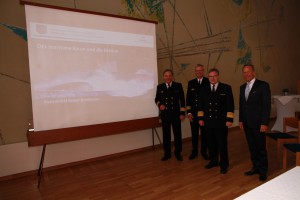 After the successful kick-off event of the Marine round tables in October 2015 Hamburg – a series of events of the Deputy Chief of Deputy Chief of Staff of the German Navy and Commander of the Fleet and support forces, Vice Admiral Rainer Brinkmann – the second Navy-Round-Table was set up at the the banquet hall of the Officers’ Society of the Medical Academy of the Bundeswehr in Munich. The aim of the Navy-Round-Tables is to provide information on the current security situation and the exchange between Navy and the economy.
After the successful kick-off event of the Marine round tables in October 2015 Hamburg – a series of events of the Deputy Chief of Deputy Chief of Staff of the German Navy and Commander of the Fleet and support forces, Vice Admiral Rainer Brinkmann – the second Navy-Round-Table was set up at the the banquet hall of the Officers’ Society of the Medical Academy of the Bundeswehr in Munich. The aim of the Navy-Round-Tables is to provide information on the current security situation and the exchange between Navy and the economy.
For the 2. Navy-Round-Table on the 21th of April 2016 Vice Admiral Rainer Brinkmann invited together with the Commander reserve Ludolf Baron von Loewenstern and the Captain reserve, Kay Rupprecht. Over 30 entrepreneurs and managers followed this invitation.
Digital Economy and Society | Data. Raw material of the 21st century
Navy and Economy in the dialogue I The first Navy-Round-Table in Hamburg
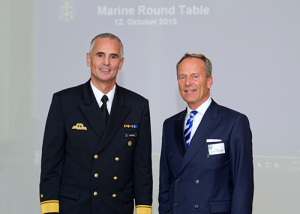 The reservists from today are authentic multipliers in the society. They give as external knowledge and experience bearers valuable contributions and new impulses in the navy. In the reality they are inalienbale as „a reserve bank“. The naval command create with this Navy-Round-Table for enterprisers and managers a new communication platform. This event serves the exchange between navy and entrepreneurs.
The reservists from today are authentic multipliers in the society. They give as external knowledge and experience bearers valuable contributions and new impulses in the navy. In the reality they are inalienbale as „a reserve bank“. The naval command create with this Navy-Round-Table for enterprisers and managers a new communication platform. This event serves the exchange between navy and entrepreneurs.
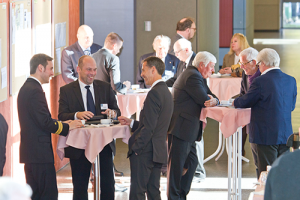 For the first Navy-Round-Table on the 12th of October Vice Admiral Rainer Brinkmann, Deputy Chief of Staff of the German Navy and Commander of the Fleet, invited together with the Entrepreneur and Commander reserve, Ludolf Baron von Loewenstern. Over 30 entrepreneurs and managers followed this invitation.
For the first Navy-Round-Table on the 12th of October Vice Admiral Rainer Brinkmann, Deputy Chief of Staff of the German Navy and Commander of the Fleet, invited together with the Entrepreneur and Commander reserve, Ludolf Baron von Loewenstern. Over 30 entrepreneurs and managers followed this invitation.
International GeoEconomic Forum
Welcome address and moderation by the Chairman Ludolf Baron von Loewenstern.
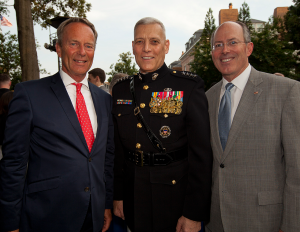 Minister Ilan Mor, Embassy of the State of Israel in Berlin: “The Current Geostrategic Conditions and the Economic Relationship between Germany and Israel”
Minister Ilan Mor, Embassy of the State of Israel in Berlin: “The Current Geostrategic Conditions and the Economic Relationship between Germany and Israel”- Major General ret. Professor Dr. Yoshinaga Hayashi, National Institute for Defence Studies, Japanese Ministry of Defence: “The World is Changing: Geopolitical Thinking using the example of Japan”;
- Dr. Ioannis Loucas, Hellenic Naval University, Special Advisor of Greece Defence Agency, British Mackinder Institute: “The Altered Geostrategic and Geo-economic Aspects of the Era after the Cold War and a Personal View into the Near Future”
Queen Mary 2 | 175th Anniversary of the Transatlantic Passage in 2015
Topic: Geopolitics in the 21st Century
Ludolf Baron von Loewenstern as Lecturer/speaker of the topics
- >Global Challenges in the Era of Crises and Conflicts<
- >The Struggle around Raw Materials<
- >Maritime Security. Securing the Global Trade and Logistic Currents<
European Council`s and UN`s Congress: International Politics, Environment and Peace / Delfi
Ludolf Baron von Loewenstern as Lecturer/speaker of the topic on “International Politics & Environment. The Issue of Energy, Sources in Germany and the EU”.
International Business & International Security Conference | European Strategic Institute
Patronage: Ole Freiherr von Beust, First Mayor of the Free and Hanseatic City of Hamburg.
Welcome address and moderation: Ludolf Baron von Loewenstern.
Talks:
- Ivan Ivanovich Sergeev, formerly Foreign Minister to the Russian Federation and President of the GlavUpDK, on the topic >International Security and International Business: The Russian Point of View<
- Vice Admiral Lutz Feldt, Inspector of the Navy, on the topic >Sea Lines of Communication and International Security Policies<
- Dr. Shaoul Shai, from the Israeli Ministry of Defence, on the topic >Securing Business in the Middle East: The Peace Process<
- Professor Dr. Jean Avenel, University of Paris III, on the topic >Money Laundry as a Threat for International Business<
- Professor Dr. Leonard Hochberg, US Stratfort Institute Washington DC, and Professor Dr. James D. Hardy, Louisiana State University, on the topic >The Asymmetric Threats Affection on International Business<
Donner & Reuschel Bank | Business Lunch
Ludolf Baron von Loewenstern speech on the topic “The Dark Side of the Internet. Cyber-Spionage and Cyber-Sabotage, Theft and Trade of Data”
The Haus Rissen International Institute for Politics and Business & BOSCH Safety Technology with the workshop “New Methods in Maritime Security”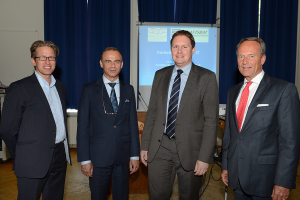
Welcome address: Dr. Michael Baumbach, BOSCH Security Systems
Thematic Introduction: Dr. Philipp-Christian Wachs, Haus Rissen
- Panel on the topic >Current Challenges of Maritime Security< with Konstantin Boroffka, Marine Risk Control Manager, Allianz Global Corporate & Speciality AG, Commander GN Torsten Eidam, Lecturer at the German Armed Forces Staff College, Ulrich Gärtner, Port Facility Security Officer, EUROGATE Container Terminal, Manfred Roß, Police Chief Superintendent, Commissioner’s Office of the Harbour Police
- Talk by Ludolf Baron von Löwenstern, Commander of the Reserve GN, Founder & Chairman of the European Strategic Institute, on the topic “Maritime Security from a Geopolitical Perspective”
International Business & International Security Conference | European Strategic Institute
Patronage: Ole Freiherr von Beust, First Mayor of the Free and Hanseatic City of Hamburg. Welcome address and moderation: Ludolf Baron von Loewenstern.
Driver of IT Innovation. Light and Shadows – Facets of the Interconnected Society | Helmut-Schmidt University/University of the Armed Forces and German Economic Council LV Hamburg Commission of Internet & Digital Economy
University Professor Dr. Hans-Peter Erb, Helmut-Schmidt University, Member of the Commission of Internet & Digital Economy, and Ludolf Baron von Loewenstern, Co-Founder and Chairman of the Commission of Internet & Digital Economy of the German Economic Council
- Talk by Dr. Carsten Brosda, Representative of the Senate of the Free and Hanseatic City of Hamburg for Media and IT, on the topic >The Senate Strategy for the Media and Digital Economy<
- Talk by Andreas Persihl, Managing Partner of Caperium GmbH, on the topic >Moral Courage. More Important than a Compliance System in the Fight against Corruption and Economic Espionage<
- Talk by Captain GN Thomas Ackermann, Head of Command Support Unit with the Navy Command, on the topic >Typical Challenges within Information and Communication Systems for the Naval Forces<
- Talk by Oliver Leisse, Trend Researcher and Managing Partner of SEE MORE, on the topic >Times of Change. What Clients Expect from us Tomorrow<
German Atlantic Society Forum
Talk by Ludolf Baron von Loewenstern, European Strategic Institute, on the topic “The Geopolitics of Resources and the Issue of German Security in the 21st Century”
Round Table | Business Club Hamburg
Talk by Ludolf Baron von Loewenstern, European Strategic Institute, on the topic “Secure Economy and the Issue of German Security in the 21st Century”
VSW Congress | Safety Day with the theme “Geopolitical Dependencies”
Sponsor: Interior Minister of Nordrhein-Westfalen.
Talks by:
- Prof. Dr. Günther Schmid, BND – German Intelligence Agency, “Changes in the Global Architecture of the 21st Century”
- Jörg Ziercke, President of the BKA – German Federal Police, “The Geopolitical Security Status in the Virtual World”.
- Ludolf Baron von Loewenstern, Chairman of the European Strategic Institute, “The Geopolitics of Resources and the Issue of German Security in the 21st Century”
- Norbert Pieper, German Post DHL, “Geopolitical Dependencies on Airfreight and Logistics”.
VfS Association for Security Technology Congress
Patronage: Michael Ulbig, Minister of the Interior
Talk by Ludolf Baron von Loewenstern, European Strategic Institute, on the topic “The Significance of the Maritime Economy from a Geo-Political and Geo-Economic Perspective”
University of Public Administration | Risk and Security Management Forum
Talk by Ludolf Baron von Loewenstern, European Strategic Institute, “The Geopolitics of Resources”
Talk by Wilko Specht (BDI – Federation of German Industry) “Challenges and Methods of Resolution for the Secure Supply of Raw Materials”.
Talk by Thomas Milde (Deutsche Telekom – German Telecom) “Telecommunication: Raw Materials of the Interconnected Society”
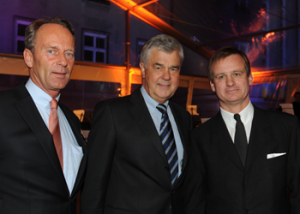 RATSHERREN-RUNDE. Das Wirtschaftsforum established in 1988 in Hamburg from Ludolf Baron von Loewenstern
RATSHERREN-RUNDE. Das Wirtschaftsforum established in 1988 in Hamburg from Ludolf Baron von Loewenstern
- Prof. Dr. h.c. Klaus-Michael Kuehne, Entrepreneur & President of Kuehne and Nagel International, and Vice Admiral ret. Lutz Feldt, DMI – German Naval Institute, on the topic “The Significance of the Maritime Economy using the example of Energy, Resouces and Transport”.
- General Wolfgang Schneiderhan, General Inspecteur of the German Forces, on the topic “Current Strategic Aspects of German Security Policy”.
- Dr. Franz-Josef Jung, Federal Minister of Defence, at the 20-year anniversary of the RATSHERREN-RUNDE on the topic “Secure Economy in the Era of Globalisation, Piracy, Terrorism, Asymmetric Threats and the Maritime Dependencies of the Federal Republic of Germany”.
- Vice Admiral Lutz Feldt, Commander of the Fleet German Navy, on the topic “From the Ambassadors in Blue to the Navy in Service”.
- General Major Christian Beck, Commander of the German Armed Forces Staff College, on the topic “Security. Retrospect – Status Quo – Prospect”.
- Senator Frank Horch, President of the Hamburg Chamber of Commerce, on the topic “Germany as the Centre of Industry. The Opportunities of Today and Tomorrow”
- Dennis J. Snower Ph.D., President of the Institute for the World Economy, on the topic “State Debt Crisis / Euro System Crisis. Quo Vadis Germany and EU?”
Maritime Power Conference: Germany as a Liberal Economy Nation in the 21st Century
Talk from Ludolf Baron von Loewenstern on the topics:
- Part 1 “Economy & Financial”.
- Part 2 “Geo-Strategy & Geo-Politics”
German Economic Forum “Leadership” at the Naval Academy Mürwik
- Prof. Dr. Michael Stuermer, on the topic “Russia and the West: Strenuous State of Suspense” and “The Greater Middle East – Modern Pandemonium”.
- Kurt Bendlin on the topic “How to Sharpen Your Skills for Leadership”.
- Captain GN Schmidt-Skipiol, Deputy Chair Commander of Naval Academy Muerwik, on the topic “What Knowledge of Leadership from the Military can be Beneficial to Industry”.
- Ludolf Baron von Loewenstern, Cdr GN res., Chairman of the European Strategic Institute, on the topic “Maritime Dependency of the Federal Republic of Germany and the EU States with Resources as a geo-strategic Factor”.
BAKS Federal Academy for Security Policy | Strategic Dialogue State and Economy Forum >Supply Chain Security<
Welcome address by the President: General Lieutenant ret. Kersten Lahl
Talks, among others, from:
- Talk by Assessor jur. Udo Eschenbach, Group Representative of Military Affairs German Armed Forces/NATO, Deutsche Post World Net, on the topic “Global Supply Chains, Global Threats: Logistics in the Conflict of a Changing Security Situation”
- Talk by Dr. Stefan Mengel, Security Research Division, Federal Ministry of Education and Research, on the topic “Supply Chain Security in the National and European Security Research Program”
- Talk by Heinz Schulte, Editor in Chief for Griphan Briefe and Krippen Global Security, on the topic “Global Security – What exactly is it?”
- Talk by Ruediger Wolf, State Secretary in the Federal Ministry of Defence, on the topic “Risks in Security Policy and Challenges at the Beginning of the 21st Century”
- Talk by Dr. Andrea Berner, Head of Division for Confidentiality and Sabotage Protection, State Office for the Protection of the Constitution, on the topic “Terrorism Blacklists and the Consequences on the Federal Republic of Germany”
- Talk by Senator ret. Udo Nagel on the topic “Supply Chain Security – Is Germany Prepared?”
- Talk by Vice Admiral ret. Lutz Feldt, President of the German Marine Institute und former Inspector of the Navy, on the topic “Maritime Security is a Political, not a Juridical Issue”
- Talk by Ludolf Baron von Loewenstern, Commander of the Reserve, Chairman of the European Strategic Institute, Member of the Federal Executive Committee of the German Economic Council, on the topic “Secure Economy. The Maritime Interests of the Federal Republic of Germany”
LIONS Club, Hamburg-Wandsbek
Talk by Ludolf Baron von Loewenstern on the topic “Secure Economy. The Maritime Dependencies of the Federal Republic of Germany in the Age of Piracy and Terrorism and the Issue of German Security in the 21st Century”.
Hanse Lounge in Hamburg
Talk by Ludolf Baron von Loewenstern on the topic “21st Century Geo-Economics and the Issue of German Security”
ROTARY CLUB Kappeln
Talk by Ludolf Baron von Loewenstern on the topic “Maritime Trade as terrorist targets”
New Philanthropic Society
Title: “Your Truth Far from Mine?”
Talk by Ludolf Baron von Loewenstern on the topic “Those who surrender freedom for security will not have, nor they deserve, either one (Benjamin Franklin)”
India Week Hamburg „New Chances for the India-German Economic Relations”
Talk by Ludolf Baron v. Loewenstern on the topic „Maritime Trade. The maritime dependence of nations India and Germany”
HSBA Hamburg School of Business Administration
Talk by Ludolf Baron v. Loewenstern on the topic „Secure Economy. Safety and security of the maritime trade in times of globalization and terrorism“
„Maritime Power. Germany as a Liberal Economy Nation in the 21st Century<
- Part 1 „Economy & Financial“
- Part 2 „GeoStrategy & GeoPolitics“
Maritime Power Forum >Mare hominis fortuna<
Talk by Ludolf Baron v. Loewenstern on the topic „A 21st Century Event for 21st Century´s Maritime Power“
Hanse-Lounge, Hamburg
Talk by Ludolf Baron v. Loewenstern on the topic „21st Century GeoEconomics and the Issue of German Security“

